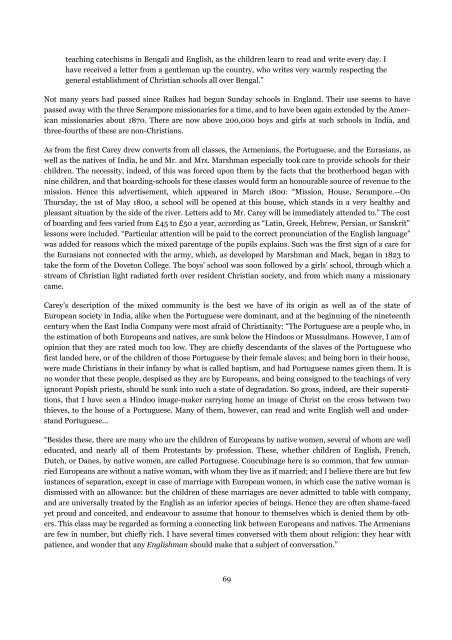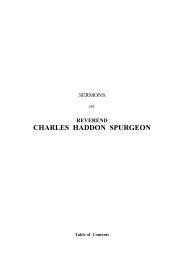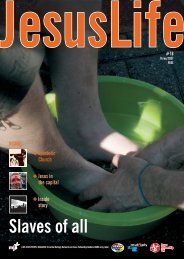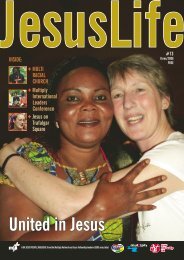Life of William Carey by George Smith - The Jesus Army
Life of William Carey by George Smith - The Jesus Army
Life of William Carey by George Smith - The Jesus Army
You also want an ePaper? Increase the reach of your titles
YUMPU automatically turns print PDFs into web optimized ePapers that Google loves.
teaching catechisms in Bengali and English, as the children learn to read and write every day. I<br />
have received a letter from a gentleman up the country, who writes very warmly respecting the<br />
general establishment <strong>of</strong> Christian schools all over Bengal.”<br />
Not many years had passed since Raikes had begun Sunday schools in England. <strong>The</strong>ir use seems to have<br />
passed away with the three Serampore missionaries for a time, and to have been again extended <strong>by</strong> the American<br />
missionaries about 1870. <strong>The</strong>re are now above 200,000 boys and girls at such schools in India, and<br />
three-fourths <strong>of</strong> these are non-Christians.<br />
As from the first <strong>Carey</strong> drew converts from all classes, the Armenians, the Portuguese, and the Eurasians, as<br />
well as the natives <strong>of</strong> India, he and Mr. and Mrs. Marshman especially took care to provide schools for their<br />
children. <strong>The</strong> necessity, indeed, <strong>of</strong> this was forced upon them <strong>by</strong> the facts that the brotherhood began with<br />
nine children, and that boarding-schools for these classes would form an honourable source <strong>of</strong> revenue to the<br />
mission. Hence this advertisement, which appeared in March 1800: “Mission, House, Serampore.--On<br />
Thursday, the 1st <strong>of</strong> May 1800, a school will be opened at this house, which stands in a very healthy and<br />
pleasant situation <strong>by</strong> the side <strong>of</strong> the river. Letters add to Mr. <strong>Carey</strong> will be immediately attended to.” <strong>The</strong> cost<br />
<strong>of</strong> boarding and fees varied from £45 to £50 a year, according as “Latin, Greek, Hebrew, Persian, or Sanskrit”<br />
lessons were included. “Particular attention will be paid to the correct pronunciation <strong>of</strong> the English language”<br />
was added for reasons which the mixed parentage <strong>of</strong> the pupils explains. Such was the first sign <strong>of</strong> a care for<br />
the Eurasians not connected with the army, which, as developed <strong>by</strong> Marshman and Mack, began in 1823 to<br />
take the form <strong>of</strong> the Doveton College. <strong>The</strong> boys’ school was soon followed <strong>by</strong> a girls’ school, through which a<br />
stream <strong>of</strong> Christian light radiated forth over resident Christian society, and from which many a missionary<br />
came.<br />
<strong>Carey</strong>’s description <strong>of</strong> the mixed community is the best we have <strong>of</strong> its origin as well as <strong>of</strong> the state <strong>of</strong><br />
European society in India, alike when the Portuguese were dominant, and at the beginning <strong>of</strong> the nineteenth<br />
century when the East India Company were most afraid <strong>of</strong> Christianity: “<strong>The</strong> Portuguese are a people who, in<br />
the estimation <strong>of</strong> both Europeans and natives, are sunk below the Hindoos or Mussulmans. However, I am <strong>of</strong><br />
opinion that they are rated much too low. <strong>The</strong>y are chiefly descendants <strong>of</strong> the slaves <strong>of</strong> the Portuguese who<br />
first landed here, or <strong>of</strong> the children <strong>of</strong> those Portuguese <strong>by</strong> their female slaves; and being born in their house,<br />
were made Christians in their infancy <strong>by</strong> what is called baptism, and had Portuguese names given them. It is<br />
no wonder that these people, despised as they are <strong>by</strong> Europeans, and being consigned to the teachings <strong>of</strong> very<br />
ignorant Popish priests, should be sunk into such a state <strong>of</strong> degradation. So gross, indeed, are their superstitions,<br />
that I have seen a Hindoo image-maker carrying home an image <strong>of</strong> Christ on the cross between two<br />
thieves, to the house <strong>of</strong> a Portuguese. Many <strong>of</strong> them, however, can read and write English well and understand<br />
Portuguese...<br />
“Besides these, there are many who are the children <strong>of</strong> Europeans <strong>by</strong> native women, several <strong>of</strong> whom are well<br />
educated, and nearly all <strong>of</strong> them Protestants <strong>by</strong> pr<strong>of</strong>ession. <strong>The</strong>se, whether children <strong>of</strong> English, French,<br />
Dutch, or Danes, <strong>by</strong> native women, are called Portuguese. Concubinage here is so common, that few unmarried<br />
Europeans are without a native woman, with whom they live as if married; and I believe there are but few<br />
instances <strong>of</strong> separation, except in case <strong>of</strong> marriage with European women, in which case the native woman is<br />
dismissed with an allowance: but the children <strong>of</strong> these marriages are never admitted to table with company,<br />
and are universally treated <strong>by</strong> the English as an inferior species <strong>of</strong> beings. Hence they are <strong>of</strong>ten shame-faced<br />
yet proud and conceited, and endeavour to assume that honour to themselves which is denied them <strong>by</strong> others.<br />
This class may be regarded as forming a connecting link between Europeans and natives. <strong>The</strong> Armenians<br />
are few in number, but chiefly rich. I have several times conversed with them about religion: they hear with<br />
patience, and wonder that any Englishman should make that a subject <strong>of</strong> conversation.”<br />
69
















